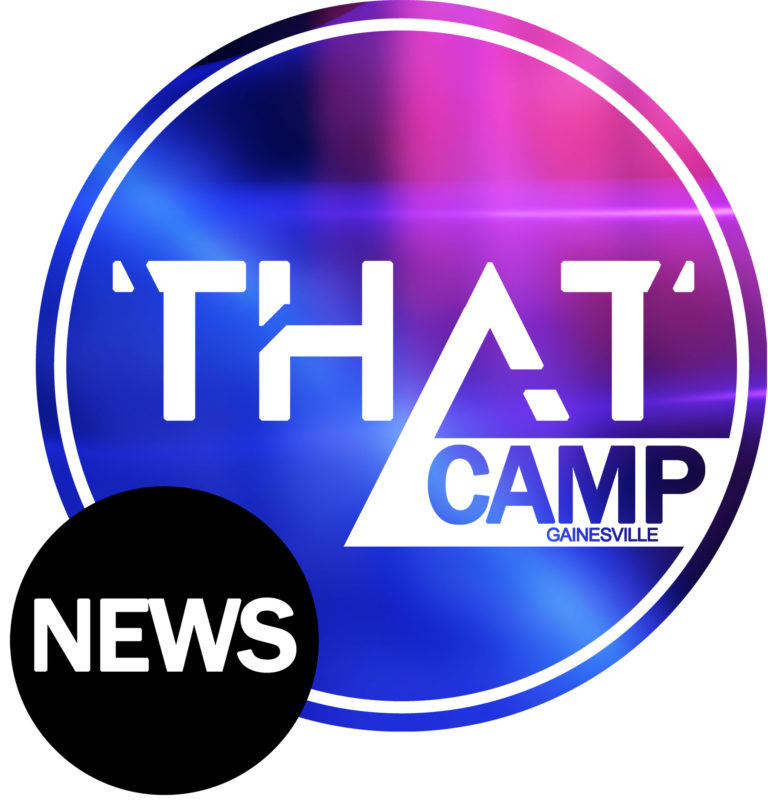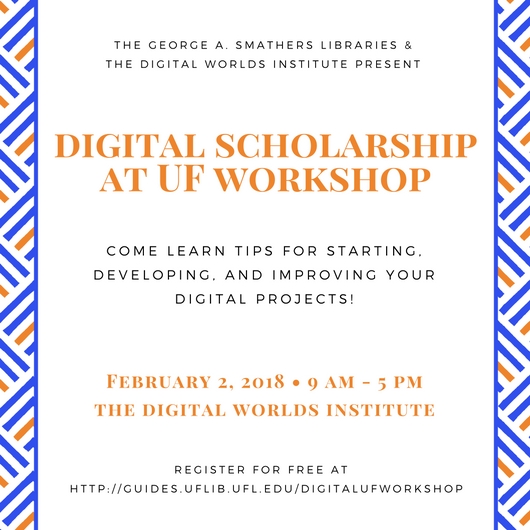POSITION VACANCY ANNOUNCEMENT
POSITION: Digital Scholarship Associate – (Library Associate 2)
REPORTS TO: Associate Chair, Humanities and Social Science Library (Library West)
SALARY: $39,529 annual salary; Actual rate will reflect experience and credentials
REQUISITION #: 503537
DEADLINE DATE: September 12, 2017
JOB SUMMARY
The Digital Scholarship Associate (DS Associate) ensures coordinated and consistent activities for instruction and outreach in Library West, especially in regards to the new and expanded needs for support with digital humanities and digital scholarship. The DS Associate is responsible for coordinating and supporting Library West’s web and social media presence, the Scott Nygren Scholars Studio, trainings and activities related to digital humanities and digital scholarship as centered in Library West and across the Libraries, and in providing support to academic faculty collaborating with the Libraries on digital humanities efforts. Each week, the DS Associate will spend 10 hours in the Scott Nygren Scholars Studio, a dynamic new digital humanities and scholarship lab, to assist and/or advise faculty, staff, and students of the UF community on digital projects in collaboration with the Libraries and to hold open hours for the Studio for drop-in visitors. The DS Associate will become an expert on using the technology and software in the Studio, and is responsible for planning, coordinating, and providing training on software and technology located in and accessible from the Studio.
The DS Associate will also serve as a member of the instruction and outreach team to provide reference and instructional services. The person in this position will perform research assistance duties such as staffing the Research Assistance desk and Ask-A-Librarian. The DS Associate also participates in state and/or national conferences on an annual basis.
RESPONSIBILITIES
Digital scholarship support
– Manages the Scott Nygren Scholars Studio (Library West 212), maintaining the space and technology.
– Schedules and holds lab hours in the Studio for 10 hours each week.
– Collaborates with librarians interested in digital humanities and closely with the Instruction & Outreach Coordinator.
– Demonstrates understanding and works toward proficiency in core digital humanities software installed in the Studio.
– Assists members of the UF community and instructs on use of the equipment and software available in the studio. Offers regular trainings on digital humanities software and citation management software (e.g. RefWorks).
– Engages and participates in digital humanities and scholarship projects with librarians and library staff. Stays current in best practices for digital scholarship and is familiar with a wide variety of academic digital projects across the nation and world.
– Plans, recruits trainers from within the Libraries and across UF as appropriate, assists trainers in obtaining access to software, equipment and other resources needed for training.
– Provides and coordinates support for non-credit and for-credit trainings and courses in digital humanities and digital scholarship.
– Coordinates and supports planning and implementing events and activities in support of the digital humanities at UF, including supporting such groups as the Center for the Humanities and the Public Sphere, the Digital Humanities Working Group, and the Center for Media Innovation and Research.
Library West Web coordinator and social media manager
– Updates the Library West website (http://cms.uflib.ufl.edu/librarywest/Index.aspx) and all pages under Library West, in collaboration with the Information Commons Librarian.
– Collaborates with the Libraries’ webmasters.
– Maintains an active, positive social media presence representing Library West on a variety of social media sites including Twitter, Instagram, Facebook, and other media outlets.
– Coordinates social media activities with the Social Media Coordinator
– Acts as a liaison between Library West and UF Social Media.
– Maintains compliance with UF social media policies, and Libraries and UF web standards, policies, and practices.
Reference and instructional services
– Assists users at the Library West Research Assistance Desk in locating library materials and instructs them in the use of: online information sources, the online catalog, the course reserves system, interlibrary loan, and basic reference materials and methods.
– Provides knowledgeable and excellent assistance to patrons of the UF Libraries.
– Holds regular shifts for the Ask a Librarian chat, email, and texting reference service and other non-traditional reference services, in addition to traditional desk services.
– Makes appropriate referrals for research assistance, instruction, and materials request to subject specialists and other branch libraries and departments.
– Assists with the Library Instruction Program, mentoring Graduate Student Teaching Assistants, teaching classes ENC 1101-1102.
– Assists and supports librarians with subject specific classes in the humanities and social sciences.
– Serves as resident expert on bibliographic citation software, such as RefWorks.
Other Duties as Assigned
– Serves on various committees and task forces at the Library and University level.
– Encouraged to attend and/or present at state and national conferences.
QUALIFICATIONS
Required
– Bachelor’s degree and four years of related library experience; or a Master’s degree and two years of related library experience; or any equivalent combination of experience, training and/or education.
Preferred
– Excellent written and oral communication skills and the ability to work effectively independently as well as collaboratively in a team-based environment.
– Excellent organizational skills and a demonstrable ability to manage multiple priorities.
– Ability to effectively serve a large and diverse user population.
– Experience working with social media tools (e.g., Twitter, Facebook, blogs, YouTube, Wikis) as part of managing web presence.
– Experience managing web presence using web authoring and editing technologies (e.g., content management systems, blogging, HTML and CSS).
– Experience with text encoding and markup (e.g., HTML, CSS, markdown, TEI, etc.).
– Experience with graphics programs (e.g., Adobe Creative Suite).
– Experience with video recording and editing technology.
– Experience with digital scholarship and digital humanities technologies in use with digital libraries (e.g., SobekCM, Omeka).
– Familiarity with technologies used to support text mining, text analysis, and topic modeling (e.g., Python, R, Mallet).
– Familiarity with UFapps (e.g., http://info.apps.ufl.edu/) and UF resources for processes involved in digital scholarship (e.g., file sharing with GatorCloud http://www.it.ufl.edu/gatorcloud/, OneDrive, and File-Express https://file-express.ufl.edu/).
– Familiarity with Research Computing technologies and processes (e.g., http://www.rc.ufl.edu/help/getting-started/) .
– Strong analytical skills and experience in planning and setting priorities.
– Experience in project management and project portfolio management for simultaneously managing multiple projects.
– Knowledge and experience working in an academic library setting, including basic reference skills and familiarity with major information sources in print and electronic.
– Demonstrated ability to remain conversant with newly evolving technologies.
THE UNIVERSITY OF FLORIDA The University of Florida (UF) is a major, public, comprehensive, land-grant, research university. The state’s oldest and most comprehensive university, UF is among the nation’s most academically diverse public universities. UF has a long history of established programs in international education, research and service. In 2013 the Florida Legislature designated UF as the state’s preeminent institution which grew into an opportunity to achieve national and international recognition for the University’s work in serving students and the world. It is one of only 17 public, land-grant universities that belong to the Association of American Universities. UF traces its beginnings to a small seminary in 1853 and is now one of the largest universities in the nation, with more than 50,000 students. For more information, please consult the UF homepage at http://www.ufl.edu.
UNIVERSITY OF FLORIDA LIBRARIES
The libraries of the University of Florida form the largest information resource system in the state of Florida. The UF Libraries consist of seven libraries on the Gainesville campus and three off-campus facilities; six of the campus libraries, and all of the off-site facilities, are in the system known as the George A. Smathers Libraries at the University of Florida. The remaining library is the Lawton Chiles Legal Information Center. Collectively, the UF Libraries (the Smathers Libraries and the Legal Information Center) hold or provide access to over 5.45 million print volumes, 8,100,000 microfilms, 1.25 million e-books, over 152,000 full-text electronic journals, over 1100 electronic databases, 1.26 million documents and 1.35 million maps and images.
The UF Libraries have built a number of nationally significant research collections, including the Latin American, Judaica, Florida History, Children’s Literature, and Maps and Imagery collections. The UF Libraries are a member of the Association of Research Libraries (ARL), the Center for Research Libraries (CRL), and the Association of Southeastern Research Libraries (ASERL). The library staff consists of more than 300 FTE librarians, technical/clerical staff and student assistants. The organizational chart is available at http://www.uflib.ufl.edu/orgchart.pdf.
The George A. Smathers Libraries are strong advocates for inclusion and intellectual freedom. The Libraries’ commitment to both is articulated in the Inclusion Statement and Intellectual Freedom Statement, both of which are posted at http://cms.uflib.ufl.edu/InclusionAndIntellectualFreedom.
HUMANITIES AND SOCIAL SCIENCES LIBRARY (Library West)
The Humanities and Social Sciences Library (Library West) is the largest branch library on the UF campus, with 14 faculty and 16 staff members, seating for 1,400 patrons, and 217 public computers, including iPads and Netbook laptops. Last year, Library West received over 1.4 million visitors. Renovated in 2006, the branch offers 16 group study rooms, 3 media rooms, including video conferencing facilities, faculty and graduate carrels as well as a limited-access floor for graduate students. Two classrooms are available, one with auditorium-style seating and the other with 19 computers for hands-on instruction. Within the branch, there are four functional units: Research Assistance, Instruction and Outreach, Collections, and Circulation; these units are managed by coordinators who oversee the daily functions. Programs and lectures are scheduled throughout the year in the Information Commons area. The branch is also home to the Libraries Administration, Human Resources and Fiscal Services, Library Facilities Planning, and the Access Support unit providing ILL and Reserves services for all branches. A Starbucks is located in the building. Organizational chart available at: http://cms.uflib.ufl.edu/portals/librarywest/LibraryWestOrganization20140623.pdf.
COMMUNITY
Gainesville, Florida and the surrounding community are home to approximately 257,000 people and both the University of Florida and Santa Fe College. Situated just over an hour from the Gulf of Mexico and the Atlantic Ocean, the city is surrounded by over 40 nature parks, including many spring-fed lakes and rivers. In 2015, Gainesville was named the “Best Midsize College City in America” by WalletHub and ranked no. 7 on Livability.com “Top 10 College Towns”. Gainesville is known as an innovative municipal government and an innovative city. Gainesville continues to receive national recognition as a top-rated city. Some of Gainesville’s accolades are listed at the Gainesville Awards and Recognition link. The Guide to Greater Gainesville combines award winning photography and compelling articles that capture all of the reasons for calling Greater Gainesville your next home. The area has numerous cultural institutions and is a haven for sports fans. Jacksonville, Orlando, Tampa, Tallahassee, and St. Augustine are all within a two-hour drive.
BENEFITS
Vacation days, paid holidays, and sick leave days; retirement plan options; insurance benefits; tuition fee waiver program; no state or local income tax. Prospective employees should review the information about employment and benefits at UF available at http://hr.ufl.edu/benefits/new-employees/.
APPLICATION PROCESS
To apply, submit 1) a cover letter detailing your interest in and qualifications for this position; 2) your current resume or CV; and 3) a list of three references including their contact information (address, telephone number, and email). Apply by September 12, 2017 (applications will be reviewed as received). Submit all application materials through the Jobs at UF online application system at Requisition 503537. If you have questions about the application process please contact Tina Marie Litchfield, tlitchfield@uflib.ufl.edu.
AFFIRMATIVE ACTION/EEO
The University of Florida is an Affirmative Action, Equal Opportunity Employer and encourages applications from women and minority group members. We are dedicated to the goal of building a culturally diverse and pluralistic environment; we strongly encourage applications from women, members of underrepresented groups, individuals with disabilities, and veterans. As part of the application process, applicants are invited to complete an on-line confidential and voluntary demographic self-disclosure form which can be found at: http://www.hr.ufl.edu/job/datacard.htm. This information is collected by the University of Florida’s Office of Human Resources to track applicant trends and is in no way considered by the Smathers Libraries in the selection process.


